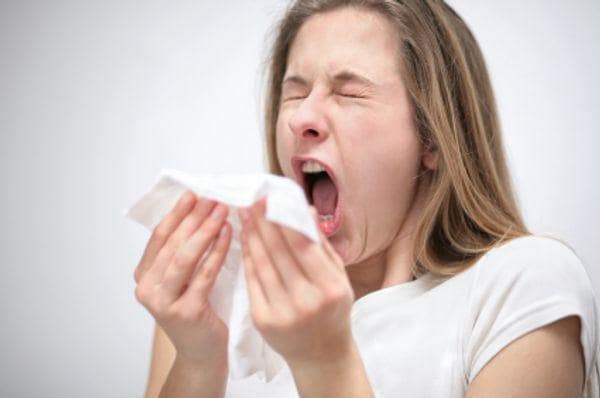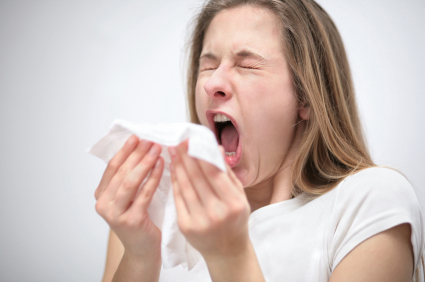Recently, I had the pleasure of interviewing Janice Joneja, Ph.D, RD, for some health videos on iHealthTube.com regarding food allergies and histamine intolerance. Dr. Joneja is a nutritionist and the author of several books, one of which is “Dealing with Food Allergies.” Currently she is working on a book specifically dealing with histamine intolerance, which often gets confused with food allergies; a good example would be dairy. Interestingly, Dr. Joneja says that people may be more than just lactose intolerant when it comes to dairy. They can actually be allergic to the protein in milk, as well.
Histamine, as we all know, is a protective, inflammatory mediator that is released in response to an allergen. However, some people are very sensitive to histamine and have a low tolerance for it. Excessive histamine in the body exacerbates allergy-like symptoms. Such people are often deficient in an enzyme that breaks down the histamine known as diamine oxidase or (DAO). I asked about the popularity of anti-histamine products and Dr. Joneja explained that in laymen’s terms, anti-histamines are just running interference in the body, but they don’t solve the problem of excessive histamine production. The most effective approach for curbing histamine production turns out to be, not surprisingly, a change in diet—a big change.
Many common foods produce histamine, and Dr. Joneja provides an extensive list of those foods in her booklet “Dietary Management of Histamine Intolerance.” As mentioned, milk and milk products are definitely excluded, as are fermented products like soy sauce or miso. No beer, wine or alcoholic beverages of any type, of course, nor chocolate or cola drinks. No sugary fruits like raisins, apricots or pineapple allowed either. No processed meats like bacon and sausage. I was very surprised, however, to see tomatoes, tomato sauce and spinach on the “do not eat” list.
Food additives can also be responsible for excess histamine production, which did not come as a surprise. In particular are tartrazine and artificial food colorings, as well as preservatives like benzoates and sulphites. (There goes the wine! No wonder I would wake up puffy after drinking wine.) In addition, common seasonings can also cause a reaction, including cinnamon, chili powder and curry power. Who knew?
This program was starting to remind me of the Candida diet I went on last year. However, grains and yeasted bread products are not restricted in this histamine diet as they are on the Candida diet. When I asked Dr. Joneja about this she indicated that very likely I experienced relief from my symptoms by eliminating histamine producing foods, such as dairy and fermented products. This was very intriguing information and it put a different spin on things for me. Perhaps it was histamine intolerance all along that was causing my symptoms rather than a yeast overgrowth. Either way, there will be no milkshakes for me; however, I can have a piece of toast!
Is it Histamine Intolerance of Food Allergies?
As we know, histamine triggers an anti-inflammatory response in the body, an immune response to allergens and foreign pathogens—a good thing. However, if you get too much histamine production going on in the body then you wind up with all too familiar symptoms like:
- stuffy, runny nose
- irritated, watery eyes
- hives
- swelling
- itchiness
- headache
Interestingly enough, according to Dr. Joneja, many of us may be intolerant to histamine, and it could be bombarding us as a result of our diets. For example, fermented foods like soy sauce and vinegar can trigger excess histamine production, as can processed meats like bacon and sausage, not to mention alcoholic beverages like beer and wine.
These days, the majority of us are familiar with lactose intolerance; some 80% of adults lack the enzyme to digest dairy products. However, Dr. Joneja views dairy products in another light, looking at them as a culprit in stimulating excess histamine production.
Given that, it’s easy to see why people could become confused as to whether their symptoms are stemming from a food allergy, or from histamine intolerance. For example, I had a friend who suffered from hay fever every spring and summer. During that time he would scrupulously avoid all dairy products due to the excess mucous they would generate. He was quite willing to do without cheese and milk in order to avoid having a continual runny nose and that was effective for him.
Would an anti-histamine have been a better option? Probably not, since Dr. Joneja indicates that these remedies are merely running interference in the body rather than providing a real solution—excess histamine response. As a nutritionist and a researcher, her conclusion is to go after the dietary sources of histamine intolerance as a more viable approach.
According to her research, restricting dairy, fermented foods, processed meats, beer and wine, as stated above, do a lot to reduce symptoms. Some other foods to limit or avoid:
- White flour and processed breakfast cereal products
- All shellfish
- Soy beans and red beans
- Most commercial salad dressings
- Sugary fruits like pineapple and raisins
- Processed and packaged foods
- Certain spices such as curry, cinnamon and anise
This is an abbreviated list, needless to say. For a more comprehensive list consult “Dealing with Food Allergies” by Dr. Janice Vickerstaff Joneja. It include vital information about sorting these two conditions out, as well as an extensive list of foods that will not cause reactions, like whole grains, fruits like bananas and apples, vegetables and freshly cooked meat and poultry (sans preservatives). Fish that is freshly caught is also allowed. All organic raw nuts are allowed, except for pumpkin seeds (even organic pumpkin seeds) or nuts that have been flavored with ingredients that are going to cause a reaction.
In the final analysis, it seems like a tricky call—food allergy or histamine intolerance. Regardless, for anyone with symptoms it’s certainly worth exploring all the possibilities.




